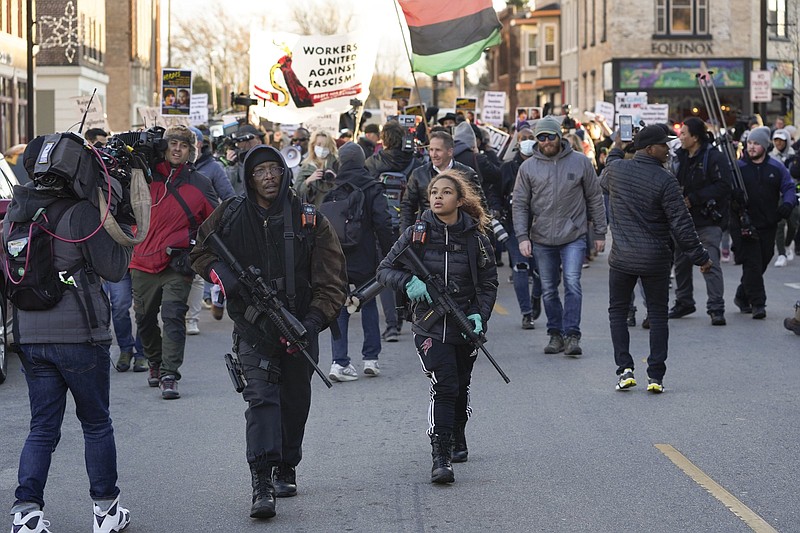KENOSHA, Wis. -- Several dozen people gathered below the wind-whipped Wisconsin flag at Kenosha's Civic Center Park on Sunday and warmed up with chants for justice before taking to the streets in protest of the acquittal of Kyle Rittenhouse.
Demonstrators traced the route Rittenhouse took the night in August last year when he shot and killed two people and wounded a third during protests over police brutality. They carried signs that said "Reject Racist Vigilante Terror" and "THE WHOLE SYSTEM IS GUILTY!" A couple of protesters carried long guns.
Protesters regularly chanted, "No justice, no peace" and "Anthony and Jo Jo" -- the latter referring to Anthony Huber and Joseph Rosenbaum, both of whom were shot and killed by Rittenhouse.
The Rev. Jesse Jackson, 80, who walked the first leg of a protest march Saturday in Chicago, was scheduled to appear in Kenosha, but did not come. Organizers said he instead was working with congressional leaders to ask that the Department of Justice investigate the case for further prosecution.
A release from Jackson's Rainbow PUSH Coalition earlier Sunday said the Justice Department should also consider aiding and abetting charges for Rittenhouse's mother.
"The verdict of [innocent] is very revealing of the state of criminal justice in America," Bishop Grant, the Rainbow PUSH Coalition National Field Director, said in a statement.
While Grant's statement said Rittenhouse violated federal laws, he did not explain further and experts say Rittenhouse is unlikely to face federal charges because federal law applies only in very limited cases for homicides.
Rittenhouse, a then-17-year-old former police youth cadet from Antioch, Ill., said he went to Kenosha with an AR-15-style semi-automatic rifle to protect property from rioters but that he came under attack and feared for his life.
His lawyers described him as a scared teenager who shot to save his life.
"I didn't intend to kill them," Rittenhouse testified. "I intended to stop the people who were attacking me."
The shootings happened during a tumultuous night of protests over the shooting of a Black man, Jacob Blake, by a white Kenosha police officer. Rittenhouse is white, as were those he shot. His acquittal led to new debates over racial justice, vigilantism and policing in America.
Across much of the nation, it has become increasingly acceptable for Americans to walk the streets with firearms, either carried openly or legally concealed. In places that still forbid such behavior, prohibitions on possessing guns in public could soon change if the U.S. Supreme Court strikes down a New York law.
The new status quo for firearms outside the home was on prominent display last week in Kenosha. Local resident Erick Jordan carried a rifle and holstered handgun near the courthouse where Rittenhouse was tried.
"I got a job to do -- protect these people. That's it," said Jordan, referring to speakers at a news conference that was held in the hours after the verdict.
Speakers included an uncle of Jacob Blake.
"This is my town, my people," Jordan said. "We don't agree on a lot of things, but we fight, we argue, we agree to disagree and go home safe, alive."
"That's real self-defense."
The comments were a counter punch to political figures on the right who welcomed the Rittenhouse verdict and condemned his prosecution.
At the Supreme Court, justices are weighing the biggest guns case in more than a decade, a dispute over whether New York's gun permitting law violates the Second Amendment right to "keep and bear arms."
Defenders of the law say that striking it down would lead to more guns on the streets of cities, including New York and Los Angeles.
During oral arguments this month, justices also appeared to worry that a broad ruling might threaten gun restrictions on subways and at bars, stadiums and other gathering places.
New York's law has been in place since 1913. It says that to carry a concealed handgun in public for self-defense, an applicant has to demonstrate an actual need for the weapon.
The Rittenhouse verdict was hard for Blacks to reconcile, Derrick Johnson, NAACP president and CEO, said Sunday.
"Here you have a 17-year-old who illegally purchased a gun, traveled across state lines to protect property that was not his, for owners who did not invite him, and he put himself in harm's way based on the rhetoric that he's seen on social media platforms," Johnson told CBS' "Face the Nation."
He called it "a warning shot that vigilante justice is allowed in this country or in particular communities."
Information for this article was contributed by Morgan Lee of The Associated Press.
